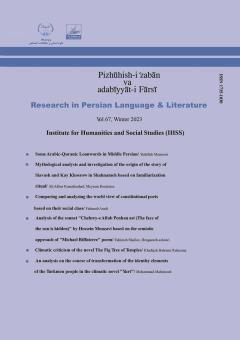Comparing and analyzing the world view of constitutional poets based on their social class
Subject Areas : مطالعات میانرشتهای ادبیات
1 - Assistant Professor, Department of Persian Language and Literature, Durood Branch, Islamic Azad University, Durud, Iran.
Keywords: Social Class, World View, Ideal, Constitutional Poets,
Abstract :
Society plays a role in the creation of artistic and literary works, and sociological studies of literature have different methods. Lucien Goldman, the owner of the theory of developmental structuralism, believes that the social class of the creator of the work affects his worldview and the worldview determines the structure of the work. In the upcoming research, the worldview of Bahar, Iraj Mirza, Aref Qazvini and Farrokhi Yazdi has been analyzed on this basis and based on the relationship between the worldview of these poets and the construction and application of the structural unit; That is, the compound addition to which the word fist is added, has been analyzed.The Fist of Time, the Strong Fist of Iran, the Hammer-like Fist, the Fist of Knowledge, the Fist of Jamaat and the Fist of Gold are the combinations thar are made by these poets. Every poet considers the fist (literally, power) to belong to something that is important in his worldview; The worldview of the poet who created "Fist of Times" is not the same as the worldview of the poet who created "Fist of Knowledge".Aref Qazvini has great ideals for Iran and the nation, and he considers natural sciences and national sovereignty to be the way to achieve them. Iraj Mirza is a prosperous prince and his ultimate will is to preserve the existing structure, so he is without ideals and knows the power of the economy and uses the golden fist. Although Farrokhi Yazdi is trying to take the side of new elements, his worldview remains an eclectic of traditional and new elements, and most of the socialist attractions are present in his worldview, and this is how he makes a hammer-like fist. The discontinuity that appears in different sections is caused by the difference in worldviews of the poets.
آدميت، فريدون (1357) انديشه هاي ميرزا آقاخان كرماني، تهران، پيام.
------------ (1349) انديشه هاي ميرزا فتحعلي آخوند زاده، تهران، شركت سهامي خوارزمي.
----------- (1340) فكر آزادي و مقدمة نهضت مشروطيت، تهران، سخن.
----------- (2535) ايدئولوژي نهضت مشروطيت ايران، تهران، پيام.
آجوداني، ماشاءالله (1382) مشروطة ايراني، چاپ نهم، تهران، اختران.
-------------- (1382) يا مرگ يا تجدد، چاپ دوم، تهران، اختران.
آريان پور، امير حسين (1354) جامعه شناسي هنر، تهران، دانشگاه تهران، انجمن كتاب دانشجويان.
آرين پور، يحيي (1372) از صبا تا نيما، تهران، زوار.
اسدی، فهیمه (1389) تأثیر تحولات سیاسی دورۀ مشروطه بر ساختار شعر شاعران این دوره، پایان نامه دکتری تهران، گروه زبان و ادبیات فارسی دانشگاه تهران.
اسكولز، رابرت (1383) درآمدي بر ساختارگرايي در ادبيات، فرزانه طاهري، چ دوم، تهران، آگاه.
ايرج ميرزا، (1352) ديوان اشعار، محمد جعفر محجوب، انديشه، تهران.
بهار، محمد تقي (1382) ديوان اشعار، براساس نسخة چاپ 1344، تهران، آزاد مهر.
حائري، سيد هادي (1364) عارف قزويني شاعر ملي، تهران، جاويدان.
-------------- (1372) آثار منتشر نشدة عارف قزويني، تهران، جاويدان.
-------------- (1373) سدة ميلاد ميرزادة عشقي، تهران، مركز.
دهباشي، علي (1387) شرح آثار و احوال ايرج ميرزا، تهران، اختران.
سيد ابوالقاسم، فرح (1374) ميرزادة عشقي (برگزيدة شاعران معاصر)، تهران، روايت.
شفيعي كدكني، محمد رضا (1380) ادوار شعر فارسي از مشروطيت تا سقوط سلطنت، تهران، سخن.
عارف قزوینی (1356) كليات ديوان عارف، سيف آزاد، تهران، امير كبير.
فرخي يزدي (1380) مجموعه اشعار فرخي يزدي، مهدي اخوت، م.
ع.
سپانلو، تهران، نگاه.
گلدمن، لوسين (1357) فلسفه و علوم انساني، ترجمه حسين اسدپور پيرانفر، تهران، جاويدان.
------------ (1369) نقد تكويني، [غياثي]، تهران، بزرگمهر.
مشير سليمي، علي اكبر (1324) كليات مصور عشقي، تهران، چاپخانة بانك ملي ايران.


